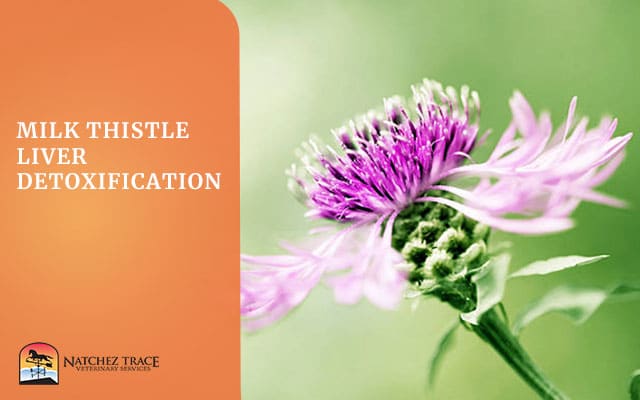Humans and animals can benefit from a milk thistle detoxification and healing regimen.
Milk Thistle Liver Health Benefits
Milk thistle is a flowering annual or biennial member of the daisy family.
The name “milk thistle” came about because of the white veins in the thistle leaves, a trait that makes it stand out from other similar-looking thistles. They are prominently banded with splashes of white.
Historically, the milky bands were thought to be Mother Mary’s milk, and this is the origin of another common name, St. Mary’s thistle. -Wikipedia
Milk thistle extract is traditionally made from the seeds.
The seeds contain approximately 4-6% silymarin, believed to give milk thistle its “liver tonic” properties.
Today, milk thistle is still one of the most commonly used medicinal plants in the world and is also the number one recommended natural herb for liver health. In fact,in Europe, milk thistle is a prescribed medication. The milk thistle extract is prescribed to treat mushroom poisoning, alcoholic cirrhosis, chronic hepatitis, drug and alcohol-induced liver damage and acute viral hepatitis, just to name a few. –LiverSupport.com
Milk Thistle is Highly Researched
Milk thistle has been chemically, pharmacologically, and clinically researched for over forty years, and over 400 studies have been cataloged by the United States National Library of Medicine and the National Institutes of Health, indicating that milk thistle is one of the world’s most beneficial herbal remedies for several liver problems and diseases.
Milk thistle extract can be used to protect the liver from the effects of alcohol, toxins from a polluted workplace or environment, and many other liver-related problems and diseases.
This herb has been found helpful in chronic active hepatitis, alcoholic cirrhosis, drug, and alcohol-induced liver damage, fatty liver, acute viral hepatitis, nonalcoholic fatty liver disease, nonalcoholic steatohepatitis, fibrosis, cirrhosis, hepatic toxicity caused by steroids, liver problems caused by environmental sensitivities and toxins, moderate to heavy alcohol use, and other medical conditions that require medications to relieve hepatic toxicity.
Milk thistle (Silybum marianum) has been used for 2,000 years as an herbal remedy for a variety of ailments, particularly liver, kidney, and gall bladder problems. Several scientific studies suggest that substances in milk thistle (especially a flavonoid called silymarin) protect the liver from toxins, including certain drugs such as acetaminophen (Tylenol), which can cause liver damage in high doses. Silymarin has antioxidant and anti-inflammatory properties, and it may help the liver repair itself by growing new cells. -University of Maryland Medical Center
Experts have concluded that milk thistle’s therapeutic effects are caused by the stabilization of liver cell membranes and stimulation of protein synthesis while accelerating the regeneration process of damaged liver tissue.
Other studies have shown that milk thistle protects liver cells removing existing toxins and blocking the entrance of new toxins.
Milk Thistle Dosage
Dr. Smith recommends supplementing with 1 gram of milk thistle per 100 pounds of body weight or 10mg of milk thistle per 1 pound of body weight.
Milk thistle has virtually no negative side effects or reports of toxicity, and can even be used by pregnant and nursing women.
Our clinic often recommends milk thistle for pets suffering from liver stress and/or disease with wonderful results.
For even better results, Dr. Smith recommends PET | TAO Harmonize Liver.
Harmonize Liver combines milk thistle with dandelion root, B-vitamins, glutathione, and other synergistic supplements for improved liver detox and support.
Are you interested in improving your pet’s health with natural remedies or herbal medicine? Contact us!
Sources:
- Buck Mountain Botanicals
- Heartspring: Liver Health – Milk Thistle by Dr. Decker Weiss, NMD
- Milk Thistle – Wikipedia
- Milk Thistle Benefits – LiverSupport.com
Note: It is always best to consult with your veterinarian before concluding that your pet has a particular ailment. Your veterinarian will also be able to recommend the best dosage of a particular remedy for your pet based on its symptoms, age, size, and specific needs.







